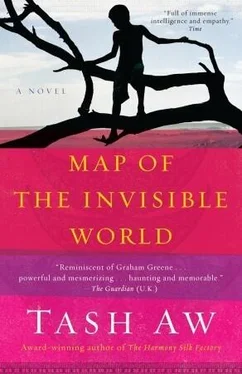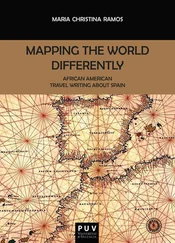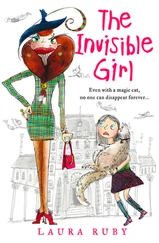Tash Aw - Map of the Invisible World
Здесь есть возможность читать онлайн «Tash Aw - Map of the Invisible World» — ознакомительный отрывок электронной книги совершенно бесплатно, а после прочтения отрывка купить полную версию. В некоторых случаях можно слушать аудио, скачать через торрент в формате fb2 и присутствует краткое содержание. Год выпуска: 2010, Издательство: Spiegel & Grau, Жанр: Современная проза, на английском языке. Описание произведения, (предисловие) а так же отзывы посетителей доступны на портале библиотеки ЛибКат.
- Название:Map of the Invisible World
- Автор:
- Издательство:Spiegel & Grau
- Жанр:
- Год:2010
- ISBN:нет данных
- Рейтинг книги:4 / 5. Голосов: 1
-
Избранное:Добавить в избранное
- Отзывы:
-
Ваша оценка:
- 80
- 1
- 2
- 3
- 4
- 5
Map of the Invisible World: краткое содержание, описание и аннотация
Предлагаем к чтению аннотацию, описание, краткое содержание или предисловие (зависит от того, что написал сам автор книги «Map of the Invisible World»). Если вы не нашли необходимую информацию о книге — напишите в комментариях, мы постараемся отыскать её.
comes an enthralling novel that evokes an exotic yet turbulent place and time—1960s Indonesia during President Sukarno’s drive to purge the country of its colonial past. A page-turning story,
follows the journeys of two brothers and an American woman who are indelibly marked by the past — and swept up in the tides of history.
Map of the Invisible World — читать онлайн ознакомительный отрывок
Ниже представлен текст книги, разбитый по страницам. Система сохранения места последней прочитанной страницы, позволяет с удобством читать онлайн бесплатно книгу «Map of the Invisible World», без необходимости каждый раз заново искать на чём Вы остановились. Поставьте закладку, и сможете в любой момент перейти на страницу, на которой закончили чтение.
Интервал:
Закладка:
The metal gate creaked open, the mailbox clanging loudly. Adam stood up and saw Margaret approaching the house with a European man.
“I think,” Din lowered his voice until it was barely more than a whisper, “we’d better keep what we’ve been discussing a secret for the time being, don’t you?”
Adam nodded, though he was not quite sure why he should hide their exchange from Margaret. All he understood was that he was already complicit with Din in some way.
Margaret paused briefly as she stepped into the house. She looked slightly perplexed to find Din there, thought Adam.
“I didn’t know you knew where I lived,” she said by way of greeting. “What brings you here?”
“I got your address from the registrar’s office. I rang a few times but there was no answer, so I thought I’d come over and check to see if you were all right. You didn’t come to the campus yesterday so I thought—”
“Thank you for your concern, but I’m perfectly capable of looking after myself. I see you’ve met Adam.”
“Yes. Well, um, I’m glad you’re okay.”
On seeing Margaret, Adam experienced the feeling of relief and security he had felt upon meeting her for the first time the previous night. The image of the young Margaret and Karl standing together in the photograph came back to him and made him remember why he had come to this city in the first place: to regain his father. “Any news?” he asked.
She frowned and shook her head; she came toward him and put her arms around him, surprising him with a long, firm hug. It did not feel foreign or bizarre to him that she should do this; he was glad that she did. “No news yet, I’m afraid, but we have our contacts working on a way to find him. We will find him.”
Din said, “I’d better go now. I just wanted to check that you weren’t in trouble. Nice to meet you, Adam.” He slipped on his black canvas shoes without bothering to undo the laces. As he closed the gate behind him he gave Adam a brief nod and smiled. Adam turned away; he did not want Margaret to see that something had passed between him and Din, something that amounted to a betrayal of her trust and hospitality. He was glad that Din had gone.
But it disturbed him to find that he could not forget all the things that Din had told him.
11
A s Margaret stood in the kitchen waiting for the kettle to boil, she tried to figure out why she had so readily embraced Adam. She could not explain what had made her feel so happy upon seeing him again, why she had been overwhelmed by a sense of relief bordering on joy at finding him safe and eagerly awaiting her return. When he stood up to greet her, the expression on his face was one of such hope and anticipation and vulnerability that she had to respond. And so she had gone up to him and put her arms around him, circling his chest tightly, as if she needed to reassure herself that he was still there. She had done so without thinking, and for all the time their hug lasted — three, four, five seconds? More? — it ceased to matter that Din and Mick had been in the room, watching.
The kettle began to whistle. Margaret poured the boiling water into the teapot and watched the darkening water swirl with tea leaves. She remembered her mother’s words to her when she was a teenager. “You’re not a tactile child, are you? I have no idea why,” her mother would say, sighing. “I suppose it’s my fault — didn’t cuddle you enough when you were a baby, or stopped breastfeeding too early. Oh dear, it seems all that Freudian nonsense is true after all. Do try to be more physical, Margaret, more expressive.” It used to rile her intensely whenever her mother said this, largely because she knew it was true, but also because she wished she found it easier to reach out and touch other people. It was not that she did not like touching or being touched — she liked both. She had no idea why it did not come naturally to her. And yet she had hugged Adam without a moment’s hesitation or embarrassment, the self-consciousness returning only later, once they had detached themselves from each other. “I’ve never got that from you,” Mick had whispered as she brushed past him on her way to the kitchen.
She opened a can of condensed milk and poured it into three mugs, stirring in the tea. She had made Mick stop on the way home so that she could buy some food for Adam — two loaves of bread, an assortment of canned meat and sardines, and a bag of hard candy. She had never been a good cook, or even particularly interested in food (that, at least, was something she had shared with her mother), but in recent months her lackadaisical approach to feeding herself had worsened, and she rarely planned meals. She would last most of the day without eating anything, and at some point in the evening she might think, I’m hungry; and then she would stop at the closest place for a bite to eat. Sometimes it was an expensive restaurant in a luxurious hotel, sometimes it was a satay or mee bandung stall by the roadside, sometimes it was a bag of peanuts at home — it made little difference to her: It was all just food.
So why was she now seized by the urge to make sure her kitchen cupboards were full? She stood before the array of canned goods, wondering how she could prepare a wholesome, tasty meal for Adam. It troubled her to think that he had not had a healthy meal for days; the remnants of his breakfast of hard, almost-moldy cheese lay on a plate in the sink, the dried-up bits of rind looking like old bread crumbs. Margaret felt ashamed; she had to change her ways, quickly, or she would not be able to help this boy.
She sliced a loaf of bread and emptied the contents of a can into a saucepan (Great Wall of China Fried Dace in Black Bean Sauce — she did not even know what Dace was); she tried to light a burner but the pilot light was out. She dipped her finger into the sauce and found it cold and slightly slimy — perfectly acceptable to her, but not for Adam. She opened a tin of Spam — the picture on the can showed what looked like a leg of ham cut into slices on a platter decorated with festive ribbons and balloons, but when she opened the can she found only an opaque layer of fat. She had no idea what lay underneath. Okay, don’t panic, Margaret Bates, she told herself, don’t lose control, you can do this.
“Mick,” she called in a half whisper, half cry, “I need help.”
“You said you were going to make dinner,” he said as he came into the kitchen.
“Yes, but …” she gestured at the growing mess around her. “I just don’t know how. I’m not even hungry, but I need to feed the boy.”
“All right.” He sighed, dropping his shoulders theatrically. “Let me see what I can do.”
“Oh, thank you, Mick. I was really really hoping you’d say that.” She went up to him and thought about giving him a hug but ended up patting him on the shoulder instead.
In the living room Adam was idly winding the red enamel alarm clock that usually sat halfway up a bookshelf. Margaret was not sure it even worked anymore. A couple of banana skins lay flaccidly on the table; fruit flies rose from them in a spiral as Margaret sat down facing Adam.
“Sorry, I ate some bananas,” he said.
“Are you okay now?” Margaret said, looking anxiously in the direction of the kitchen, hoping that Mick would hurry up.
He nodded. “I’m fine.” In his hands the clock revolved slowly, the words golden cock made in china spinning around and around again.
“My father has a limp,” he said, concentrating on the clock. “He walks in a funny way. Did you know that?”
Margaret nodded.
“One day, I don’t know why, he came to meet me at school. He bicycled, but he was not used to it and it was far. With his weak leg he couldn’t go very fast and the bike wobbled and looked very stupid. All the other children were laughing at him, and I remember feeling ashamed and wishing that I had a different father, one with two strong legs.”
Читать дальшеИнтервал:
Закладка:
Похожие книги на «Map of the Invisible World»
Представляем Вашему вниманию похожие книги на «Map of the Invisible World» списком для выбора. Мы отобрали схожую по названию и смыслу литературу в надежде предоставить читателям больше вариантов отыскать новые, интересные, ещё непрочитанные произведения.
Обсуждение, отзывы о книге «Map of the Invisible World» и просто собственные мнения читателей. Оставьте ваши комментарии, напишите, что Вы думаете о произведении, его смысле или главных героях. Укажите что конкретно понравилось, а что нет, и почему Вы так считаете.












